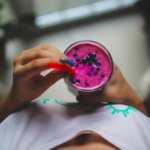I talk about 8 functional foods that can help calm inflammation, boost neurotransmitter synthesis and restore common nutrient deficiencies that might contribute to low mood and mental health conditions.
My name is Dr. Talia Marcheggiani. I’m a naturopathic doctor with a focus in mental health and emotional wellness as well as hormonal health and hormone balancing, and today I’m going to deliver a short video about some foods that you can add to your diet to help your mental health.
These are all medicinal foods that act like prescriptions, like anti-depressants, that you can just add to your diet. So, a lot of these foods are recommended based on the idea that depression is an inflammatory condition in the brain. There’s more and more research that shows that there’s low levels of inflammation in people who have depression and anxiety and other mental health conditions like bipolar disorder, schizophrenia, ADD, ADHD and even sub-diagnostic symptoms, such as brain fog and cognitive disruptions. So all of these are a result of some kind of inflammation in the brain. And so a lot of these foods are working to heal depression and anxiety with their ant-inflammatory properties.
And so the first thing that’s recommended to eat are lots of anti-inflammatory fats. These are omega 3 fatty acids such as fish oil. So you can either increase the amount of fish oil by having fatty fish three times a week. You can remember what a fatty fish is by the acronym SMASH. And SMASH stands for sardines, mackerel, anchovy, salmon and herring, and also trout, so SMASHT. And these kinds of fish are rich in the omega 3’s EPA and DHA. Our body can make EPA, but some of us have impaired ability to make it. And so supplementing is necessary for a lot of these people. If you’re looking for a fish oil, make sure you look for one that has a higher amount of EPA compared to DHA. This is very important, because studies on depression are very favourable for fish oil supplementation, but the ratio of EPA to DHA has to be at least 3:1 or higher, and the higher the ratio, the higher the amount of EPA relative to DHA, the better the anti-depressant effects, and the mood-regulating effects. So, fish oil actually showed positive outcomes treating bipolar disorder and schizophrenia, so there’s a mood-stabilizing effect as well. And we think because our brain is made up largely of DHA and EPA, but also the anti-inflammatory effects are very helpful for mood and emotional balancing and mood balancing.
Coconut oil is also another great oil you can add to your diet. Coconut oil is a saturated fat, but it’s rich in something called Medium Chain Triglycerides. So these are saturated fats that the body uses readily for energy. So they don’t go through the normal process of digestion that other fats have to go through. They’re absorbed in our lymphatic system. So we get those fats, the energy from those fats, right away.
Coconut oil is very anti-bacterial and anti-fungal, so it can help regulate bacterial balance in our gut and it can give you a boost of energy. There’s also some evidence that being in ketosis, so this means relying on fats for energy, as opposed to carbohydrates, and, to an extent, proteins. Being in ketosis, so burning fat for fuel: body fat or dietary fat, has a mood-stabilizing effect. And so you might read about intermittent fasting, Ketogenic diet. I wouldn’t recommend doing that without working with a functional medicine practitioner, nutritionist or a naturopath, because there are some negative downsides to doing those kinds of diets prolonged, without supervision, but there is some growing evidence for that. But one thing you can do is add coconut oil to a morning smoothie, or eat a couple of tablespoons in the morning, even looking at some Bulletproof coffee recipes, that can also help with keeping your mood steady or your energy high in the morning.
Staying on the topic of fats and nuts, something that is really great for mental health are Brazil nuts. And Brazil nuts are high in a nutrient called selenium, which our body needs to create an anti-oxidant, the main anti-oxidant in our body, glutathione. You may have heard me talk about n-acetyl cysteine, NAC, which is an amino acid that I often recommend for people with bipolar disorder, for schizophrenia and, to an extent, depression and anxiety, and especially personality disorders, like borderline personality. There can be a very strong mood-stabilizing effect with NAC. And that’s probably because—we’re not exactly sure why that is—but it’s probably because NAC is the precursor to what our body uses to make glutathione, but we can’t make glutathione without selenium. So two brazil nuts a day, and they’re really delicious and fun to eat, they’re big nuts—two brazil nuts a day gives you the 200 mcg of selenium that’s the therapeutic dose. It’s also helpful for thyroid health.
Another thing I tend to recommend and am recommending a lot more in my practice is collagen, specifically gelatin, but for the more health-food minded people, going with a collagen hydrosylate supplement from grass-fed meat is something that I often recommend. But, for most people and myself, I just throw some gelatin that you can buy at Bulk Barn, into a shake or into a seed bowl, or into something that I’m eating like oatmeal, or I’ll make jello out of it.
So, gelatin is really rich in collagen, so it’s made from the hooves of animals, and collagen has a gut-stabilizing effect, so it can help heal the gut. A lot of us suffer from something called “leaky gut” in which inflammation in the gut makes its way to the rest of our body and can affect our brain. Leaky gut can often result in “leaky brain”, resulting in inflammation in the brain and then mental health symptoms. So, collagen helps to repair the gut barrier and the blood-brain barrier. It’s also very anti-inflammatory because it’s high in an amino acid called glycine, which is a calming neurotransmitter as well as an amino acid. It can also help balance the immune system. So anyone that has a low level of autoimmunity, or maybe your immune system is on the sluggish side and you’re getting colds and flus and infections more readily than others, collagen is a great supplement for that. Because our main sources of protein: meat, legumes, whole grains, nuts and seeds, don’t contain a lot of glycine. We’re pretty glycine deficient in our society because we’re not eating that much gelatin, we’re not getting as much bone broth. And so you can get collagen from from making bone broth, from stewing bones and accessing that bone marrow, or you can get it from something like gelatin, which is from hooves, from the collagen-rich membranes, the cartilages, of animals. There’s also fish collagen for more pescatarian-oriented people.
Collagen is also really great for anti-aging, for treating hair loss, for skin and for cellulite. So, all aesthetic things that might bring someone in to my practice, but also really great for mood balancing. A good source of protein as well.
You can either just throw it into a shake, mix it into some water or make your own jello. And I make jello by boiling some fruit, about a cup of blueberries in water. I boil it until the blueberry juice is extracted, then I add a couple tablespoons of gelatin and then I put it in the fridge until it’s hard. And you have a natural jello you can serve to your kids. It’s pretty good.
Another great food to help balance your mood and mental health is turmeric. Turmeric, or curcumin, as it’s scientifically called, is a spice that is used mostly in India. It’s a yellow spice, it stains things yellow: your clothes, your counter, your intestines. It has very very strong anti-inflammatory benefits. It also helps the liver detoxify, it’s been shown to have anti-cancer properties, it’s a really powerful, nutrient-rich plant, root. So studies have shown that two grams per day of turmeric actually outperformed Prozac for treating depression and probably this is due to its anti-inflammatory properties in really lowering inflammation in the brain, which we know is really one of the underlying roots of depression. The way that we get to that inflammation is different in every person with depression, but there is this kind of common thread of inflammation that’s going on in every case of mental health condition, mental illness. So, adding turmeric to foods, or supplementing with turmeric, is a great way to combat that inflammation and keep moods balanced.
Some other foods you might want to add to your diet are foods that are rich in zinc. So, these are mainly things like pumpkin seeds. You’ve got to get around two cups, though, of pumpkin seeds, to get a decent therapeutic dose of zinc, or oysters. Or you can supplement with zinc. Zinc, again, is anti-inflammatory, it can help heal the gut. We need it to make neurotransmitters and enzymes that our brain needs to rebalance mood. And there’re also some studies that zinc increases something called BDNF. BDNF is a chemical in the brain that help with neurogenesis, this is the creation of new neurons in an area of the brain called the hippocampus. So you may have heard “you can’t teach and old dog new tricks” or that our neurons never regenerate once we reach a certain age, and this is not true because new research has shown that we do have neurogenesis, something called neurogenesis, that increases and changes and grows new neurons even as we age. And so anyone suffering from brain fog or really high amounts of cognitive stress, or mental illness, maybe benefit from zinc as that increases the neurogenic abilities of the brain. It’s also very anti-inflammatory and it can help with leaky gut and leaky brain situations. Vegetarians, unfortunately, are often deficient in zinc just because we get most of it from animal products and animal sources, but really upping your pumpkin seed intake might get you to a therapeutic level of zinc or you can supplement as well.
Another really great addition to your diet to help balance mood and to improve your mental and cognitive health are fermented foods. So, these include things like kefir, kombucha, kim chee, saurkraut, and yogurt, if you do dairy. These things, they contain probiotics, and studies show that it may be better to supplement or to add fermented foods to your diet rather than supplementing with a probiotic, and this is obviously an individualized recommendation that would have to be made by a doctor, but adding fermented foods to your diet, especially if you make them at home and ferment them at home, like you make your own kombucha or your own kefir, that can actually boost the probiotic capacity of your gut. Probiotics actually make neurotransmitters, they make things like serotonin, and the calming neurotransmitter GABA and they can help us digest our food, like gluten, as well as combat inflammation and regulate our entire immune system. It’s also important to feed those probiotics with something called resistant starch that you can find in carbohydrates that have been cooled to room temperature after they’ve been cooked, so, for example brown rice that’s after it’s been cooked as been cooled to room temperature, potato starch, green bananas, black beans, and jerusalem artichokes. These are all starches that bacteria feed on and that keeps them populated in the gut. Coconut oil tends to kill more pathogenic bacteria and therefore can promote a healthy bacterial balance.
And lastly, I’m going to talk about leafy greens. So, adding a cup of spinach, or two cups of spinach or chard to your diet will give you the amount of magnesium you need. Magnesium has a calming effect on the body. We need it to make the neurotransmitters like serotonin, dopamine and melatonin, to help with sleep. Magnesium also can help balance mood and help us with stress. A lot of us suffer from stress. It can also make our brain more resilient to stress, as stress is one of the major causes of neuro-inflammation in people with mental illness and this can be stress from a significant trauma, it can be psychosocial stress, interpersonal stress, the stress of being out of work, even long-term chronic stress or burnout from school and work and things like that. So, two cups of spinach gives you your daily magnesium serving. You can also get it from chocolate but you need to eat quite a bit of chocolate.
So, in boosting your mental health, or in promoting mental and emotional wellness, you can add all of these foods to your diet and balance your inflammation, feel good and nourish yourself.






